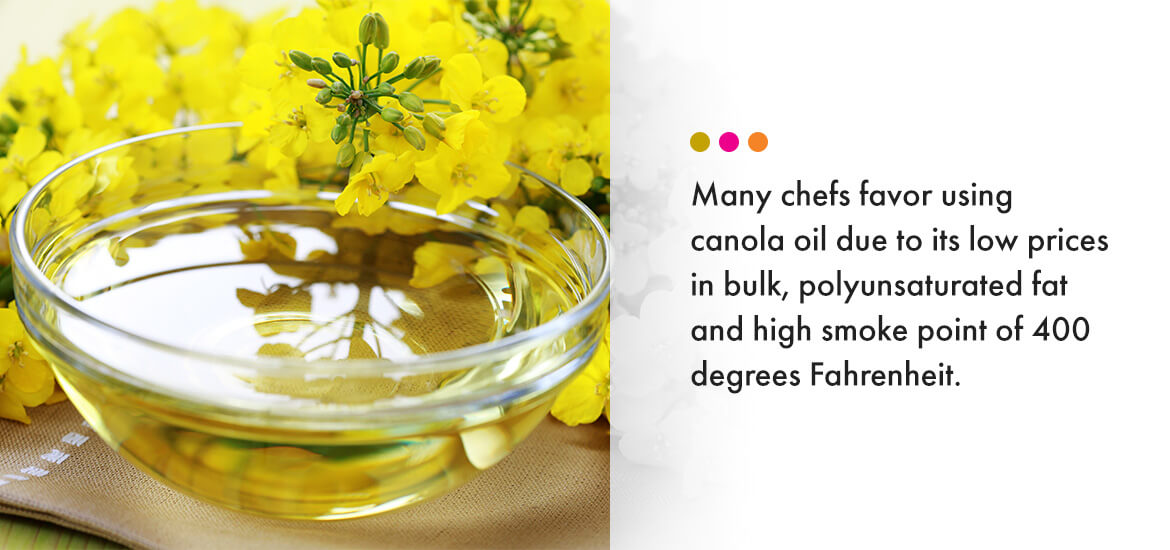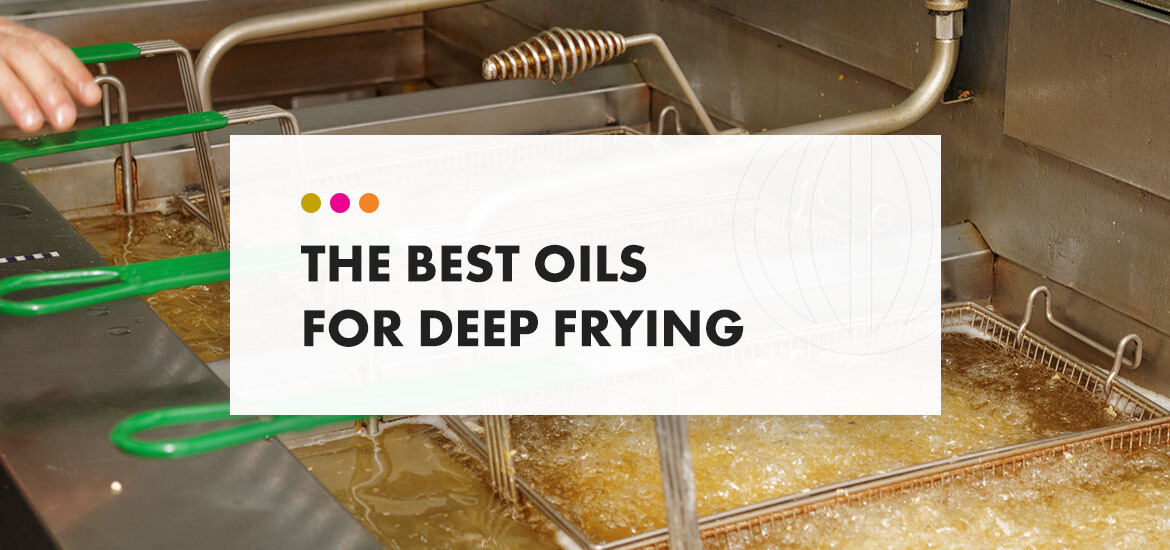The Best Oils for Deep Frying
Table of Contents:
- How to Choose the Right Cooking Oil for Your Application
- 3 Best Oils for Commercial Deep Frying
- How Often Should You Change Your Fryer Oil?
- How to Dispose of Used Cooking Oil
Creating mouthwatering dishes for others to savor is one of the most satisfying factors of being a cook. When creating fried dishes, you want to make sure you’re using the right kinds of oils. What type of oil do restaurants use for deep frying?
The best oil for deep frying depends on your recipes, preferred flavors and many other factors influencing your cooking techniques. Take a look at the top commercial deep fryer oil options to use in your kitchen, deli or cafeteria.
How to Choose the Right Cooking Oil for Your Application
Commercial deep fryer oil varies by several factors, including cost, taste and overall quality. Depending on your cooking preferences and customers, you’ll likely prioritize one variable over the other. Luckily, several cooking oils offer numerous beneficial factors.
Here are some variables to consider as you browse cooking oils for restaurants:
- Price: If you serve food to hundreds of people daily, affordable cooking oil prices are likely one of your top priorities. Buying oil in bulk allows you to stock up on this essential ingredient in large quantities, so you’re always prepared to serve a crowd. Luckily, lower prices don’t mean you have to sacrifice great flavor. You can still create mouthwatering meals while saving on the overall costs of purchasing commercial deep fryer oil in bulk.
- Quality: Cooking oils contain various levels of saturated and healthy fats. Higher-quality oils provide polyunsaturated or monosaturated fats. These fats are healthy in small quantities.
- Smoke point: The proper temperature that each cooking oil requires varies. When the temperature becomes too hot, and your oil begins smoking, it has reached its smoke point. This limit starts to emit odors and create unsavory flavors that impact the taste of your meals. Each oil has its unique spoke point range, and you’ll typically want to choose a cooking oil with a higher smoke point so you can cook with it at various temperatures.
- Flavor: Some oils are rich in flavor, and others have a flat taste. Consider what kinds of foods you plan to fry and choose your cooking oil accordingly to create the best flavor and texture possible.
3 Best Oils for Commercial Deep Frying
So, what kinds of oils are best for commercial deep frying applications? While you can find numerous oils for different kinds of frying, only a few have the necessary elements to create deliciously deep-fried foods. Take a look at three of the best oils for commercial deep frying:
1. Canola Oil

The most common type of oil that restaurants use for deep frying is canola oil. Many chefs favor using canola oil due to its low prices in bulk, polyunsaturated fat and high smoke point of 400 degrees Fahrenheit.
With a higher smoke point range, chefs can cook their ingredients more thoroughly without odors and unsavory flavors impacting the food’s quality. Of all your options, canola is one of the best oils for commercial deep frying and cooking oils for restaurants.
2. Vegetable Oil
Vegetable oil is a great go-to for your deep-frying needs. This oil has a high smoke point of 400 degrees Fahrenheit to cook your food thoroughly and leave a crunchy texture. It also contains unsaturated fat, which is the healthier type of fat that may reduce heart disease risk and high cholesterol levels in the body when eaten in moderation.
Whether you’re cooking French fries or fried chicken, vegetable oil offers a mild taste that won’t mask your foods’ natural flavors. This way, you don’t have to worry about the oil altering the way your dishes are supposed to taste.
3. Peanut Oil
Another effective deep-frying oil to use in your kitchen is peanut oil. This option offers a subtle nutty flavor perfect for deep-frying desserts, vegetables and meats.
If rich flavors and crispy textures in your food are your top priority, peanut oil is your go-to option. With an impressive smoke point of 450 degrees Fahrenheit, you can add a delicious taste to your deep-fried dishes when using peanut oil.
This frying oil option can be helpful to keep on hand as an alternative to use when you run out of your main oil choice.
How Often Should You Change Your Fryer Oil?
Saving your cooking oils after use allows you to practice resourcefulness right in your kitchen. The best practices for reusing cooking oil include the following:
- Strain the oil a few times.
- Once cooled, store your used oil in a plastic or tin container and replace it frequently to ensure flavorful food.
- Label the container by the food you prepared with the oil. Writing “meat” on the container can prevent you from cooking sweets using the same oil.
- Keep the container of oil in a dark, room-temperature space for better quality and longevity.
- Reuse the oil for cooking the same kind of ingredients up to five times before replacing it.
- Dispose of the oil once it changes color and odor.
How to Dispose of Used Cooking Oil
Whether you’re an experienced chef or starting as a cook in training, you likely know the golden rule of disposing of cooking oil — you should never pour used oil down the sink drain. Even in professional settings, oil has set guidelines for safe disposal. In restaurants where large oil disposal is common, you should avoid storing and throwing away used oil in the trash. Some states even restrict this action altogether due to the harm that used oil can cause to the environment.
For larger used oil removal, such as in restaurants that fry many dishes daily, you can trust Baker Commodities to help you responsibly dispose of your oil. With the help of safe bulk oil disposal to clear your restaurant kitchen of leftover deep frying messes, you can get back to creating delicious meals in no time. This method is the best course of action to save your drains and plumbing from becoming backed up or violating state oil disposal laws.

Remove Large Used Oil Quantities With Baker Commodities
If you work with cooking oil often, Baker Commodities can make your oil disposal easier. Without proper grease and oil removal, you may face fines and penalties on top of a clogged drainage system. We prioritize collecting used grease and oil you no longer need, so you can get rid of your kitchen’s used oil in an eco-friendly and ethical manner.
Whether you work in hospitality, education or another industry where you cook with oil frequently, Baker Commodities can work with you to create a grease collection pickup schedule that works for your needs. Contact us today with any questions about our services.



